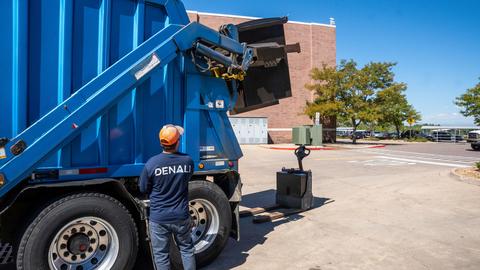Walmart renews food waste recycling partnership
Walmart is annually diverting millions of pounds of food waste from its stores away from landfills.
The discounter is renewing an agreement with Denali, a full-service recycler of organics, to provide food waste recycling at its 4,700 stores in the U.S. Through this partnership, Walmart and Denali will help direct inedible food products toward beneficial uses such as creating compost, feeding animals and generating renewable energy.
With new innovations in recycling technology, Denali predicts the amount of waste avoided will grow substantially over the next five years. In addition, the two companies will continue to explore new strategies and tools to reduce food waste and maximize the positive impacts of recycling.
“Walmart is a leader and innovator in making retail more sustainable. Denali is proud to provide services that bring Walmart closer to its goal of zero waste in its U.S. operations by 2025,” said Denali CEO Todd Mathes.
Walmart pursues regenerative practices
Walmart is committed to becoming a “regenerative” company — helping to renew people and the planet through its business. First announced in September 2020, Walmart’s regenerative goals include reaching zero emissions in global operations and committing to help protect, manage or restore at least 50 million acres of land and 1 million square miles of ocean by 2030. Through innovations in energy and transportation, Walmart seeks to power 100% of its global operations with renewable sources of energy by 2035 and achieve its overall goal of zero emissions across global operations by 2040.
More recently, Walmart and its wholesale chain Sam’s Club have announced a new initiative with General Mills to bolster regenerative agriculture across the United States. Together, the companies aim to adopt regenerative agriculture practices on 600,000 acres of land by 2030.
Denali – an overview
Across its operations, Denali says it recycles more than 10 billion pounds of organic materials each year, a significant portion of which comes from grocery retailers like Walmart. In doing so, Denali leverages its team of approximately 1,500 employees and fleet of more than 1,000 trucks to put organic waste streams to use while avoiding disposal in landfills.
According to Denali, the greenhouse gas mitigation impact of its recycling food waste, which is one of several waste streams Denali manages, is annually equivalent to taking approximately 100,000 cars off the road or providing electricity to more than 60,000 homes for one year.
Denali works with compost manufacturers, including its own network of 24 compost facilities, to turn food waste into soil amendments. The company also partners with local farms to supply certain types of food waste as feed for animals and provides food waste to anaerobic digesters for the creation of renewable energy.



